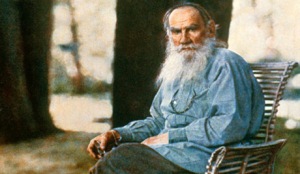Occasionally, it’s nice to wake up with nothing in particular planned for the day. It doesn’t happen very often, but every once in a while, I have the luxury of not having to jump up out of bed the moment the alarm goes off and can instead laze under the duvet with a mug of coffee and a good book.

Lev Tolstoy in 1908
I recently decided to revisit War and Peace by Lev Tolstoy, which I first read when I was at university ie a fair few years ago! It’s hard to imagine anyone publishing a novel of that length these days; I expect most modern editors would be itching to cut huge chunks out of the book. There are whole chapters dedicated to relatively minor characters and pages and pages of Tolstoy’s philosophising about the nature of history and the role played by great men. And yet taken together, all these things are an essential part of the whole. They’re what make it feel real.
In the chapter I read last, Tolstoy describes how an officer, Prince Nezvitsky, is pinned up against the railings of a bridge as a whole company of soldiers swarm across it. Although Nezvitsky is a completely minor character, Tolstoy nevertheless treats us to his thoughts about the river flowing around the piles of the bridge, snatches of conversation he half-hears, his feelings and anxieties about the battle ahead.
For a short while, the reader is plunged into Nezvitsky’s world, and can identify with him completely, so that we too are trapped on the bridge, can hear the water roaring below, mud spattering and shouts and sweat of the oncoming troops. We too feel Nezvitsky’s relief when a fellow officer helps him break free.
This is what Tolstoy does so brilliantly – he creates an immersive world so full of the detail of actual lives that the reader cannot help but feel a part of it. There’s something very visual, almost cinematic, about the way the whole panorama unfolds as before our eyes.

What a novel allows, however, as film rarely can, is insight into the characters’ thoughts and feelings. Tolstoy – by all accounts pig-headed and frequently insensitive in real life – nevertheless has an uncanny, almost magical knack for describing the deepest and darkest corners of the human heart.
He creates rich, complex, distinctive and very fallible characters, who cannot be other than the way they are. Thus it makes perfect sense that Natasha Rostova, a younger member of a large boisterous family and the child of warmly generous, spendthrift parents, should be impetuous, passionate, unguarded and completely charming. Or that Pierre Bezukhov, the illegitimate son of a fabulously rich but distant father, should be insecure, clumsy, earnest, and shy. Or that Prince Andrei, the motherless son of a pedantic and exacting father, should be arrogant and ambitious.

Audrey Hepburn in the 1956 film of War and Peace
No doubt, many people find the sheer length War and Peace off-putting, but it isn’t a difficult book to read; Tolstoy’s style is wonderfully clear and accessible. And knowing you’ll be spending a good few hours in the company of his wonderful characters only makes it seem better.
 Eddie Redmayne at the 2015 Oscars, where he won best Actor
Eddie Redmayne at the 2015 Oscars, where he won best Actor 




